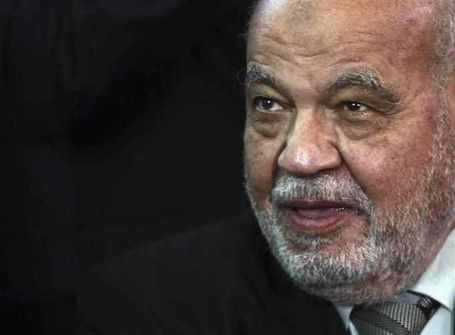CAIRO: Egypt bade farewell Thursday to its Nobel prize-winning novelist Naguib Mahfouz, celebrated as one of the greatest writers in modern Arab literature, who died at the age of 94. Cairo s district of Nasr City was blocked off to traffic as Mahfouz, who died Wednesday after weeks of illness, was given a fully fledged national funeral, attended by President Hosni Mubarak and top officials. The author s coffin was wrapped in an Egyptian flag and briefly carried on a horse-drawn hearse down a soldier-lined street in the capital, as the official procession walked slowly behind.
Some mourners held a black sign with Goodbye Arab s Shakespeare written on it. Sheikh Mohammed Sayyed Tantawi of Al-Azhar mosque led the funeral prayer for the absent at nearby Al-Rashdan mosque as Egypt mourned the world s foremost Arab writer and one of its most renowned ambassadors. The procession, broadcast live on national television, was preceded by a more intimate religious ceremony when around 200 people gathered at the Al-Hussein mosque in old Islamic Cairo for the public funeral Mahfouz had requested before his death. Tantawi was also present and paid homage to Mahfouz for making Egyptian literature known to the rest of the world. Amid tight security, relatives, friends and admirers gathered in the heart of the city where Mahfouz was born and which he described with great mastery during his seven-decade literary career. Egypt s top cleric, Grand Mufti Ali Gomaa, celebrated a man who loved Egypt and was faithful to the nation as he led the faithful in prayer in the neighborhood which saw him come to this world, making it the place of his birth and his death.
In an apparent acknowledgement of the writer s broad appeal across Egyptian society, two senior figures and five lawmakers from Muslim Brotherhood, Egypt s biggest Islamic group, attended the funeral. This was despite its statement on Wednesday that Children of Gebelawi was seen as a violation of Islamic tenets.
One of them, Mohammed Abdel Qudous, described Mahfouz as a great, modest and devout Muslim man, in an interview with Egyptian state-run television. The Muslim Brotherhood is the largest opposition group in parliament but remains formally banned. World leaders Wednesday stressed the commitment to peace and dialogue between civilizations of Egypt s foremost novelist, while friends and artists praised the pioneering nature of Mahfouz s works and his simple kindheartedness. Born in Cairo in December 1911, Mahfouz was Egypt s best-known intellectual with around 50 novels to his name. He began writing at the age of 17 and had his first book published in 1939. A flurry of other novels followed, but it was the Cairo trilogy – Between the Palaces, Palace of Longing and Sugarhouse, published between 1955 and 1957 – that propelled his name to the forefront of Arab literature. However, his 1959 novel Children of Gebalawi was banned by Egypt s Islamic Al-Azhar University for his controversial views on religion. Virtually every artist in Egypt looked up to Mahfouz, and messages of condolence poured in from disciples, friends and fellow writers who were influenced by his writings. Sonallah Ibrahim, now probably the most prominent living Egyptian writer, told AFP: Mahfouz should be considered the master of the Arab novel. Each one of his novels was a new experience. Naguib Mahfouz is to Arab fiction what the pyramids are to Egypt, he said. His moderate views on Israel and the religious disillusionment that comes through in some of his works earned him criticism throughout the years, but Egypt was unanimous in celebrating one of its greatest figures Thursday. Naguib Mahfouz has passed away and there is no doubt it will be years before Egypt gives birth to a man of his stature, who could be its ambassador not only in the world of literature but also in its aspiration for freedom and progress, the Al-Masry Al-Youm daily wrote. Agencies



